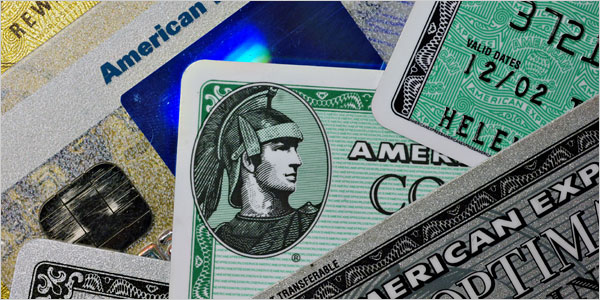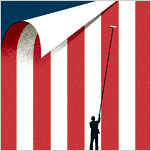You probably know that credit card companies have been scrutinizing every charge on your account in recent years, searching for purchases that thieves may have made. Turns out, though, that some of the companies have been suspicious of your own spending, too.
Your Money Guides
Credit and Debit Cards »
American Express, based in Manhattan, says it kept no list of shops that would hurt one’s credit.
Readers' Comments
What reason has your card company given you for changing your terms?
In recent months, American Express has gone far beyond simply checking your credit score and making sure you pay on time. The company has been looking at home prices in your area, the type of mortgage lender you’re using and whether small-business card customers work in an industry under siege. It has also been looking at how you spend your money, searching for patterns or similarities to other customers who have trouble paying their bills.
In some instances, if it didn’t like what it was seeing, the company has cut customer credit lines. It laid out this logic in letters that infuriated many of the cardholders who received them. “Other customers who have used their card at establishments where you recently shopped,” one of those letters said, “have a poor repayment history with American Express.”
It sure sounded as if American Express had developed a blacklist of merchants patronized by troubled cardholders. But late this week, American Express told me that wasn’t the case. The company said it had also decided to stop using what it has called “spending patterns” as a criteria in its credit line reductions.
“The letters were wrong to imply we were looking at specific merchants,” said Susan Korchak, a company spokeswoman. The company uses hundreds of data points in making its decisions, she said, adding that the main factor in determining credit lines “has always been and still is the overall level of debt, relative to the card member’s financial resources.”
The company will still have plenty of other data to judge your creditworthiness, though. American Express executives have spoken candidly to investors and analysts about its deep dives into your data.
A spokesman for Citigroup says that it is using some mortgage data to help it make credit decisions, but it is not using specific store data or looking at types of merchandise purchased. A spokeswoman for Capitol One said that geography was one of many factors it considered and that it, too, did not make decisions based on where people shop.
Bank of America and Chase declined to comment on precisely how their underwriting works, though it’s safe to assume that they and other companies are looking at more data more carefully than they ever have before.
In the grave new world of the ever-worsening economy, lenders of all sorts are grasping for any sort of information that may shield them from ruin. In recent investor presentations, American Express executives have noted how much better the company’s data-mining capabilities are than they were during the last two downturns.
As technological advances give banks better tools and exponentially more information on who their customers are and what they do all day, they no longer have to wait long to tweak their formulas. “We have clients changing risk policies daily, depending on what they see in the marketplace,” said Dennis Dixon, the president of Zoot, a technology company in Four Corners, Mont., that helps banks and others make credit decisions.
The question, then, is how much of the data they can use before spooking their customers. Kevin D. Johnson, a 29-year-old Atlanta resident who runs a marketing and communications firm, received a letter from American Express last October saying that his credit limit was being lowered. One reason was that other customers who had used their cards at places where he had shopped were late in paying their bills.
The company couldn’t — or wouldn’t — tell him which charges had met with its disapproval. Frustrated, he told his story to the local newspaper and on “Good Morning America.” He also began documenting his experience on newcreditrules.com, where he posted the names of all the merchants he patronized, in the hope that other American Express customers would cross-check his list with theirs and solve the mystery.
When I queried the company this week, before it changed its policy, I noted that if it wouldn’t tell people which establishments were suspect, people would have no choice but to guess. The truly paranoid, presumably, would stop using American Express cards altogether.
But American Express couldn’t possibly go public with such a list. If it did, the merchants on the list, who generally pay the company a lot of money to accept its cards, would have a fit and hurl their Amex terminals into the nearest body of water.
Now, the company says that there never was such a list. So what about the language in its letters to cardholders, which calls out particular “establishments” where cardholders had shopped, I asked. Well, apparently that was all just a big misunderstanding, despite the number of people who must have been in on drafting the notes in the first place.
American Express wouldn’t have been the first company to try cordoning off certain industries. Last year, CompuCredit, a subprime lender, got in trouble with the Federal Trade Commission for failing to disclose that it could reduce customers’ credit lines for using their cards at various establishments.
What was on CompuCredit’s no-go list? Marriage counselors, tire retreading and repair shops, bars and nightclubs, pool halls, pawnshops and massage parlors, among others.
Robert Manning, a longtime critic of the industry and the author of “Credit Card Nation,” also pointed out that American Express ran the risk of discouraging a lot of virtuous behavior. “If someone shops at the Dollar Store, he’s a prudent steward of his financial resources, but the blunt instruments at Amex suggest that he’s changing his financial behavior,” he said. “There’s this ecological fallacy that if I suddenly make a charge at Wal-Mart, my line of credit would get bumped down.”
But while American Express has pulled back from snooping on your shopping, it’s still paying attention to other ways you spend. In one presentation to analysts, it noted that people with multiple residences and multiple mortgages used to be a good bet. Now, the reverse is true.
The company is also using credit reports to identify your mortgage lender. If it’s a subprime lender or one that has gone bankrupt, that could affect the size of your credit line. Borrowers do not necessarily have a say in determining who ends up owning or servicing their mortgage, though. Ms. Korchak, the American Express spokeswoman, said that customers should call the company if they think there is any confusion about the identity of their original lender.
American Express has also been looking at the health of the industries where its small-business cardholders work. If you’re a dentist, say, you may have less trouble with the card company than if you work in construction or finance. Al Kelly, the company’s president, said in a presentation in August that it had made changes in credit limits “by looking at industries that are facing, or might face, incremental stress.” The “might face” could encompass all sorts of industries of the company’s choosing.
So if you want to keep your credit unchanged, it now makes sense to actively manage your credit portfolio and look at it even more frequently than you do your investments.
If a card company lowers your credit limit, for instance, it can hurt your credit score, since one factor in your creditworthiness is how much of your available credit you’re using at any given time. You want that percentage to be as low as possible, so you may have to pay down debt or use your cards less.
That said, if you have a high credit limit, that may make you a target, too. American Express has said it is keeping a particularly close eye on those customers.
If it feels as if you simply can’t win here, remember that you do have choices. You can avoid credit cards in most instances. Or you can join a credit union or look to smaller banks, where better deals may be available.
Card companies presume that you’ll suck it up and pay more or adjust your spending if they change their terms on you. But because they deploy such different tactics, you have the opportunity to leave one company and patronize another.














